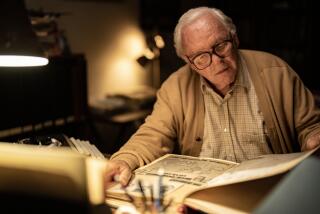Harry Patch dies at 111; last British army veteran of World War I
Harry Patch, Britain’s last survivor of the trenches of World War I, was a reluctant soldier who became a powerful eyewitness to the horror of war and a symbol of a lost generation.
Patch, who died Saturday at 111, was wounded in 1917 at the third battle of Ypres near the Belgian village of Passchendaele, which he remembered as “mud, mud and more mud mixed together with blood.”
“Anyone who tells you that in the trenches they weren’t scared, he’s a damned liar. You were scared all the time,” Patch was quoted as saying in the book, “The Last Fighting Tommy,” written with historian Richard van Emden.
The Fletcher House care home in Wells, southwest England, said Patch “quietly slipped away” on Saturday morning.
Prime Minister Gordon Brown said the whole country would mourn “the passing of a great man.”
“The noblest of all the generations has left us, but they will never be forgotten. We say today with still greater force, ‘We will remember them,’ ” Brown said.
“We will never forget the bravery and enormous sacrifice of his generation,” said Queen Elizabeth II.
Britain’s Ministry of Defense called Patch the last British military survivor of the 1914-18 war, although British-born Claude Choules of Australia, 108, is believed to have served in the Royal Navy during the conflict.
Patch was one of the last living links to “the war to end all wars,” which killed about 20 million people in years of fighting between the Allied Powers -- which included Britain, France and the United States -- and Germany and its allies.
No French or German veterans of the war are still alive. The last known U.S. veteran is Frank Buckles of Charles Town, W.Va., 108, who drove ambulances in France for the U.S. Army.
Born in southwest England in 1898, Patch was a teenage apprentice plumber when he was called up for military service in 1916.
After training he was sent to the trenches as a machine gunner.
Patch was part of the third battle of Ypres in Belgium, an offensive that began July 31, 1917. It was not until Nov. 6, 1917, that British and Canadian forces had progressed five miles to capture what was left of the village of Passchendaele. The cost was 325,000 Allied casualties and 260,000 German.
Patch’s war had ended Sept. 22, when he was seriously wounded by shrapnel, which killed three other members of his machine gun team.
“My reaction was terrible,” he said. “It was losing a part of my life.”
His most vivid memory of the war was of encountering a comrade whose torso had been ripped open by shrapnel. “Shoot me,” Patch recalled the soldier pleading. The man died before Patch could draw his revolver.
“I was with him for the last 60 seconds of his life. He gasped one word: ‘Mother.’ That one word has run through my brain for 88 years. I will never forget it.”
When he was wounded, Patch said, he was told that the medics had run out of anesthetic, but he agreed to go ahead with surgery to remove shrapnel from his stomach.
“Four people caught hold of me, one each leg, one each arm, and the doctor got busy,” he recalled. “I’d asked him how long he’d be and he’d said, ‘two minutes,’ and in those two minutes I could have damned well killed him.”
After the war ended in 1918, Patch returned to work as a plumber, got married and raised a family. He didn’t start talking about his war experiences until the 21st century. He outlived three wives and both of his sons.
During World War II, Patch volunteered for the fire service and helped in rescue and firefighting after German bombing raids.
At 101, he received the Legion d’Honneur from the French government. Last year, Poet Laureate Andrew Motion wrote a poem about him, “The Five Acts of Harry Patch.”
Last November he and two fellow veterans, former airman Henry Allingham and former sailor Bill Stone, attended remembrance ceremonies in London to mark the 90th anniversary of the war’s end. Stone died in January. Allingham, who became the world’s oldest man, died July 18 at 113.
At a remembrance ceremony in 2007, Patch said he felt “humbled that I should be representing an entire generation.”
“Today is not for me. It is for the countless millions who did not come home with their lives intact. They are the heroes,” he said. “It is also important we remember those who lost their lives on both sides.”
More to Read
Start your day right
Sign up for Essential California for the L.A. Times biggest news, features and recommendations in your inbox six days a week.
You may occasionally receive promotional content from the Los Angeles Times.






